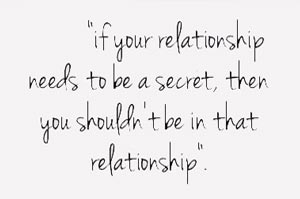“Just the thought of you being with someone else literally makes me feel sick. I can’t believe you would do this to me. I can’t believe you would do this to us! After all we have gone through and after all we have built together, I can’t believe you would throw it all away without a thought or concern for anyone but yourself. What were you thinking? Did you even think of how I would feel? Did you even care? Does this  stranger mean more to you than your own family? You have ruined all our lives just to follow your feelings and please yourself.
stranger mean more to you than your own family? You have ruined all our lives just to follow your feelings and please yourself.
So is this about sex? Are you not attracted to me anymore? Did you ever find me attractive? Am I such a miserable failure? It feels like my heart is being torn out of my body. Why are you doing this to me?
I am angry but I am also deeply sad. I’m grieving the loss of a dream. I guess it was a dream because I thought we had a strong loving relationship while all along you were giving your love and attention secretly to someone else.
How could you look at me and act like nothing was happening while knowing you were lying to my face? Some part of me feels like a big fool- for loving you, believing you, and trusting you. Well, you’ve broken that trust, and I don’t know if I can ever get that back again.”
The Purpose Behind Affairs
People have affairs for a variety of reasons, but the ones I hear in therapy are often, “I felt someone paid attention and was interested in me”, “It’s fun”, “I felt important to someone”, “It feels good”. Although most of us enjoy the security, companionship and comfort of a committed, monogamous relationship, we also might desire the passion and intensity that comes from a new relationship, especially a secret one.
People have affairs because they consider it nobody else’s business (not even their partners’). This affair might be about sex only; it could be an emotional affair they don’t consider infidelity; it might add spice to their committed relationship; it might be a lifelong personal style and they have no interest in changing; it could be perceived as a reward for working hard and fulfilling responsibilities. An affair can also be payback or a passive-aggressive act against the committed partner.
 Most people, however, don’t decide- they slide into an affair. Conscious thought doesn’t enter into the picture. An innocent acquaintance gradually becomes more intimate until it’s the primary source of pleasure. An innocent acquaintance gradually becomes more intimate until it’s the primary source of pleasure. The affair begins with two people sharing information or an activity; they bond around personal contact and mutual experiences. With little or no conscious thought, they cross the line into infatuation. Once the affair relationship start to provide a sensual or sexual high, then it’s “game over.” You are now under the influence of infatuation, one of the strongest forces found in nature. Infatuation sets up an insatiable craving for more contact that’s practically impossible to resist.
Most people, however, don’t decide- they slide into an affair. Conscious thought doesn’t enter into the picture. An innocent acquaintance gradually becomes more intimate until it’s the primary source of pleasure. An innocent acquaintance gradually becomes more intimate until it’s the primary source of pleasure. The affair begins with two people sharing information or an activity; they bond around personal contact and mutual experiences. With little or no conscious thought, they cross the line into infatuation. Once the affair relationship start to provide a sensual or sexual high, then it’s “game over.” You are now under the influence of infatuation, one of the strongest forces found in nature. Infatuation sets up an insatiable craving for more contact that’s practically impossible to resist.
It’s easy to be judgmental about affairs. But being attracted to another person is normal. For some, monogamy is compatible and comfortable. For others, monogamy takes a more conscious effort.
An important clarification regarding affairs- contrary to popular belief- is that affairs can and do happen in good relationships. You can be in a happily committed relationship and still meet someone at work with whom you have chemistry. If you follow the chemistry, an affair will follow.
The Disconnect from Affairs
Infidelity threatens the connection between two people in many ways. Affairs break trust, lack of trust creates anxiety, and managing anxiety is exhausting. Affair-repair takes a lot of energy.
Affairs change your image of your partner. Whether you had the affair or you’re reeling from your partner’s affair, the experience will show you another side of one another’s personality. When we are in the throes of fear or shame, none of us function at our best.
Affairs are traumatic. Trauma is any real or perceived threat to survival. When you are in a committed love relationship your partner becomes an attachment figure. This means, your partner’s attention determines your feeling of security and survival. So if your partner chooses someone else over you, it feels like you are going to die. Affairs evoke fear of abandonment. Even though affairs most often are the result of your partner’s unilateral, personal decision, it’s hard not to take it as a personal affront. When you’re reeling in the hurt it’s hard to reach the love that once connected you.
The unfaithful partner can feel shame because:
- I broke my promise of fidelity. I lied and cheated.
- I gave away what I promised to you.
- I went against my core values. I disappointed the people I love.
The betrayed partner can feel shame because:
- I told other people what you did to punish you.
- Like a fool, I trusted you.
- I took you back after all the hurt, the betrayal, and everything you’ve done.
- I’ll put up with anything, so what does that say about me?
Shame is a disabling feeling that can make you want to hide, shut down, and disconnect from the pain as well as the partner. Pain makes us defend and protect ourselves. You don’t feel connected when you’re busy defending.
Transforming Affairs
Affairs can bring out the best and worst of times when trying to repair your relationship. The best of times can include realizing how important you are to one another, having fun together, being vulnerable and compassionate, becoming better communicators, making new commitments, being affectionate and having great sex.

Affairs can also bring out the worst of times. If you had the affair you may feel like
you never loved your committed partner. You may grieve the loss of the affair partner and resent your committed partner for taking that away. You might believer you will never be as happy as you were with the affair partner. You might even believe you have lost the love of your life.
If you are the betrayed partner, you may feel like you’re riding an emotional roller coaster. You may feel like your whole life has been a lie and the rug was pulled out from under you. You may have feelings of hatred and revenge, even violence, something you never thought you could feel. You may become obsessed about micromanaging your partner’s behavior and want to monitor every hour of the day. You may hack a phone or computer, plant a GPS device, or hire a private detective. You may want to stay one minute and run away forever in the next. It may feel like temporary insanity to either of you or both. The good news is, it’s not only possible to survive but to thrive in a relationship after an affair. Here are some basic steps to facilitate the process:
Step One – Zero Contact:
Generally, recovery and repair can’t begin until there is zero contact with the affair partner. That means no face-to-face visits, phone calls, emails, texts, or internet contact – nothing. That also means no fantasizing, re-reading communications, listening to your “special music,” or revisiting the love scenes. This can be especially difficult when the affair involves someone from work.
Step Two – Informed Consent:
Most individuals need some relevant information and facts about the betrayal including, but not limited to, names, places, time spent together, money spent on affair/ affair partner, activities, and details. The partner who was betrayed has the right to the information to make an informed decision about moving forward. It’s difficult to rebuild a relationship without a foundation of honesty. Giving relevant information is also an indication that the unfaithful partner is protecting the committed partner not the affair partner. In couples therapy, this is called a “disclosure” session.
Step Three – Remorse:
The partner who betrayed must understand and have compassion for the betrayed partner’s pain caused by the infidelity. This is a pivotal step. Without remorse, forgiveness is difficult, if not impossible. Without remorse, further betrayal is probably. It’s not about just being sorry but being able to tell your spouse why you are sorry.
Step Four – Forgiveness:
This step is vital for the relationship to grow and prosper, and it is often a difficult process for the betrayed partner. It means to let go of anger, bitterness and being able to see good in yourself and your world. It does not mean to forget what happened, but to see it in a way that doesn’t make you toxic and sick.
Step Six – Create a New Contract:
This doesn’t mean you need a formal, legal document (although some couples do), but be sure you’re in agreement about what it means to be in a committed, monogamous relationship. Most couples commit to being lovers, best friends, confidants, playmates, financial partners, social partners, each other’s priority above everything else, and always on each other’s side.
Recommitment
Most couples get into relationships without discussing expectations and behaviors that are acceptable and unacceptable for the relationship. It’s important for both of you to be on the same page about your recommitment to one another. A therapist can be a good third person to help you create a safe space for this. Some couples even have a recommitment ceremony after a period of healing and forgiveness.
After the Affair
Once time has passed and healing has begun, it may be important to look at issues that were in play before the affair took place. Addressing unresolved issues, changing communication patterns, and revitalizing your sex life may be in order as you move forward together, but only well after you both have recovered from the betrayal.
The ultimate question for couples facing infidelity are the following.  These can also be addressed in psychotherapy with a professional who is familiar with guiding you through to build trust, safety and a positive connection.
These can also be addressed in psychotherapy with a professional who is familiar with guiding you through to build trust, safety and a positive connection.
- Is this a relationship that I want to nourish, cherish and value as a priority in my life?
- What actions will you take in your relationship to be the best partner you can be?
- What expectations will you have of yourself to be an excellent partner?
- What action steps can I take to keep my relationship exciting, alive and meaningful.
- What are your core values?
- How can you live each day with authenticity and without regret?
Recovering from an affair can be well worth the hard work. Many couples will tell you even though they never would have chosen this path, their relationship became stronger and more rewarding through the journey.
Paraphrased from “You’re Tearing Us Apart – 20 Ways We Wreck Our Relationships and Strategies to Repair Them” – Pat Love, Eva Berlander, and Kathleen McFadden
